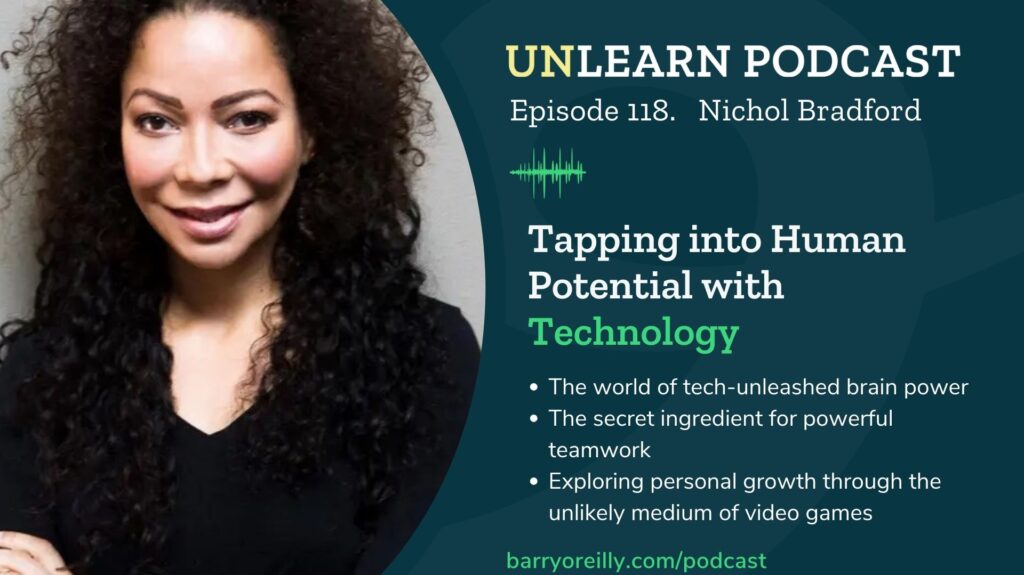What if we have barely scratched the surface of human potential? According to Nichol Bradford, a pioneer in technology and human transformation, we need to challenge the assumption that machines will surpass humanity. Nichol has led operations for gaming giants like Activision Blizzard and Epic Games in China. She built communities that connected people globally through the power of shared narratives. Now she lectures at Stanford and Singularity University, while investing in startups focused on wellbeing and personal growth. In this episode of Unlearn Podcast, Nichol and host Barry O’Reilly discuss how we can use technology to unlock our emotional intelligence, creativity, and cognition. Rather than a dystopian future of humans versus machines, she proposes a human-centered path to amplify our abilities.
A Passion for Human Transformation
While writing a book and reflecting on her life’s path, Nichol realized she’s always cared about the “act of transformation” – how someone becomes their best self. She first recognized this passion at age 13, when she vowed to overcome her shyness and find her place in the world. By senior year, through purposeful effort, she went from wallflower to popular student. This early experience showed Nichol the power of deciding who you want to be and taking action to become that person. Barry highlights that stepping outside your comfort zone can unlock tremendous self-learning. Some of his most formative moments were from personal choices to pursue the unknown. Though uncomfortable, these experiences expanded his worldview and self-knowledge. [Listen from 2:05]

Unlearning Limiting Beliefs that Restrict Human Potential
“What I’m interested in is human potential realized,” Nichol tells Barry. “And then how do we use technology to amplify that?” Our long-held assumptions place artificial limits on how we envision human potential. In reality, we have barely begun to tap the capabilities of the human body and mind, she remarks. Neuroscience research reveals the brain’s uncanny abilities that operate below our conscious awareness. In one study analyzing AI-generated images, people’s conscious minds were fooled by fake faces, but their subconscious brain activity showed they could distinguish real from fake 100% of the time. [Listen from 9:00]
State of Flow
When people are in rapport, their nervous systems synchronize in measurable ways; for example, their pupils dilate in rhythm, their voices harmonize, and their movements align subconsciously. This state is called synchrony. It is visible during group flow states, like when a sports team is “in the zone” together. However, synchrony alone doesn’t guarantee group flow, Nichol says. The key distinction is that group flow always involves synchrony, but people can exhibit synchrony without experiencing group flow. Barry adds that high performing teams often have natural synchrony, but explicitly naming it as a goal and measuring it could be powerful. Computers and AI can now detect synchrony objectively by analyzing video, audio, and physiological signals.There is enormous potential in applying technology like synchrony tracking to amplify human collaboration and group intelligence, Nichol and Barry agree. For example, if teams had a “synchrony score” during meetings, it could help them intentionally build more synchrony. [Listen from 14:50]
The Importance of Healthy Conflict
Nichol says an important lesson to unlearn is avoiding conflict. “Conflict seeking and conflict avoiding are not the same thing. You can be someone who doesn’t avoid conflict, who also doesn’t seek it,” she points out. Most people dread disagreement, but when handled well, it is essential for growth and performance. She notes that conflict-avoidant leaders can damage organizations, but it’s less obvious than brash types. Making friction an official role, where people take turns challenging ideas, helps normalize healthy dissent. We must unlearn anxiety around productive disagreement. [Listen from 20:36]
Games as Collective Storytelling
“I went into games because it’s the next evolution in human storytelling,” Nichol tells Barry. She recognized how shared narratives shape cultural identity. Games allow new modes of collective mythmaking, she believes. She also noted the social connection enabled by multiplayer experiences: interactive games that involve immersive shared storytelling can help unlock key emotional, social, and cognitive skills in those who participate. She ties this to the idea of narrative flexibility – rewriting your internal narrative to transform as a person. Games could make this practice entertaining and social. As such, games can be tools for developing our higher selves, not just commercial entertainment. [Listen from 25:50]
Expanding Human Potential with Technology
Rather than viewing technology as dehumanizing, Nichol is exploring how it can empower self-actualization. She sees her life’s work as enabling human transformation on both individual and collective levels. Each person must first clearly define an inspiring vision for who they want to become, then take committed action to become that best version of themselves. Barry adds that every transition point in life represents an opportunity to unlearn previous limiting beliefs, in order to make space for new growth. [Listen from 31:25]















